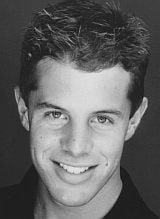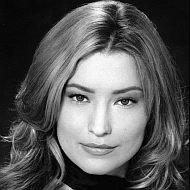
Three San Francisco Opera Adler Fellows, accompanied by Blier, were the singers: soprano Leah Crocetto, mezzo-soprano Renée Tatum, and tenor Andrew Bidlack. Their performances were spirited in both voice and gesture, as they sang in German, in English translations, and, in some songs, both languages. All three were able to switch on a dime (or a groschen) from German to American-accented English — not always easy for operatically trained singers. Their command of cabaret language and style made this century-old repertoire accessible to hearers also connected to today’s popular and classical styles. Blier even complimented the large, enthusiastic audience for laughing in the right places.
Some of the best singing was done after intermission. A group of songs came from Weill’s Happy End — a play on which he collaborated with Bertold Brecht — starting with “Bilbao Song,” sung in English by the three singers, alternating or in unison. Crocetto’s singing of “Was die Herren Matrosen sagen” (What the sailors say) was a major tour de force. From the verses describing a voyage and the rising of a storm, to the recurrent tango refrain, her voice, both singing and speaking, was beautifully suited to the words. “The sea is blue”: for the repetition of “blue” she found a lovely, haunting sound. In Weill’s song “Nanna’s Lied,” she used a nice bit of sprechstimme (speech-song) in one of the verses.

In 1944, as World War II raged in Europe, Weill was asked by our State Department to write a song to be recorded and dropped behind enemy lines. He complied with a torch song in which a woman reproaches a man for breaking his promises to her. It is a metaphor for the German people, betrayed by Hitler’s promises. The song is “Wie lange noch?” (How long before it’s over?). Tatum gave her rich mezzo-soprano sound to a moving performance of this song, and also to “Song of Indifference,” by Olaf Bienert, the words translated into English from the German of the eminent poet Kurt Tucholsky. Blier’s accompaniment contributed a nice swing to the Bienert song.
Bidlack gave a masterful performance of a patter song by Weill: torrents of German words describing a bordello in Mandalay. And he sang Hanns Eisler’s antiwar song “Der Graben” (The trench), also on a text by Tucholsky: a lament for sons, fathers, and soldiers of many nations, sent to the trenches of the Great War by capitalists, statesmen, and arms manufacturers. Bidlack’s singing on this all-too-familiar theme was heartfelt.
All About Autos, Amors, and Adolf
The first half of the concert covered a wide range of repertoire from the Berlin Kabarett culture, many of the texts still speaking to our culture. Political songs included Friedrich Holländer’s “Wenn der alte Motor wieder tackt” (When the old car revives) with its scorching description of major swindles, and Weill’s “Caesar’s Death,” a thinly veiled attack on Hitler.
Songs about sex, in this concert, mostly were from a female point of view: Holländer’s “Tritt mir bloss nich auf die Schuh” (Don’t step all over my shoes), Rudolf Nelson’s “A Little Attila” (“when love gets too vanilla,” the lyric continues), and Olaf Bienert’s “Sleepless Lady” and “Nur Das” (both sopranos, in the latter song, making quite clear what is on all men’s minds: that). Bidlack’s rendition of a gay liberation song, Arno Billing’s “Lila-Lied” (Lavender song), updated a line in the chorus, substituting “Our civil rights” for “Lavender nights.”
Several songs were reflections on city life — for instance, Weill’s “Berlin im Licht-Song” about turning on the lights, and Bienert’s “Augen in der Gross-Stadt” (Eyes in the big city) about being lonely in a crowd. From Weill’s Der Silbersee came “Fennimore’s Song,” which deals with the trials of being a poor relation, and “The Shopgirls’ Duet,” which comments on the importance of appearance. The duet was the only song that was written and performed in harmony; all the other joint performances were sung in alternation or in unison on the melody.
Steven Blier from time to time regaled the audience with useful and entertaining program notes. Adler Fellow Allen Perriello joined him at the piano a couple of times for four-hands accompaniments.

